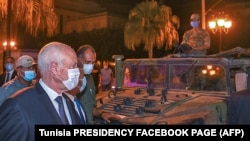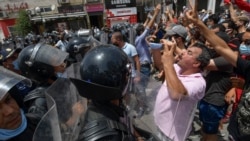On September 11, Tunisian President Kais Saied walked down Habib Bourguiba Avenue in the heart of the capital Tunis, where, days earlier, a 35-year-old man had set himself on fire in an act of protest. That incident recalled vegetable vendor Mohamed Bouazizi’s self-immolation in December 2010 to protest the confiscation of his cart by the police, sparking the Arab Spring.
Tunisia has been in a state of political crisis since July, when Saied dismissed Prime Minister Hichem Mechichi, shuttered the country’s parliament, rescinded its members' immunity from prosecution, arrested various officials and took over the office of public prosecution.
The president has also imposed a month-long nationwide curfew and restricted public gatherings to no more than three people.
Saied, an independent outsider with conservative views and support from the Islamist Ennahdha party, won Tunisia’s 2019 presidential election in a landslide. He had previously served on the committee that helped the parliament draft the 2014 constitution.
Saied’s July moves came after protesters took over the streets of Tunis demanding a change in the government. Many Tunisians welcomed the president’s measures, but political parties, activists and lawyers feared a shift toward authoritarianism.
Saied said the emergency powers he invoked were constitutional, telling Sky News Arabia:
“They are talking about a coup and trespassing the constitution, but we, contrary to what they say, respect the law.”
But that is misleading. In fact, while Saied denied accusations of dictatorship, he is now Tunisia’s sole ruler and decision-maker. He has hinted he will hold a referendum to approve a new constitution.
The current constitution, which was drafted in 2014, is considered one of the most progressive in the Arab world. It provides for a semi-presidential system with the prime minister being more powerful than the president.
According to the constitution, the state of emergency was supposed to last 30 days in accordance with Tunisian laws. Should the state of emergency persist, the president is required to step aside and let the parliament order the constitutional court to take over.
However, Saied announced on August 23, that the emergency measures would remain in place “until further notice.” Human Rights Watch (HRW) said in an August report that his decision deepened Tunisia’s crisis because there is no parliament to ask for a constitutional court ruling.
“The institutional checks designed to keep Tunisia from reverting to the authoritarian rule it endured from independence in 1956 until the Arab Spring in 2011 are not in place,” HRW said.
On September 11, HRW denounced Saied’s move to strip members of the parliament of legal immunity, which placed 50 officials and politicians under arbitrary house arrest and left dozens of others facing arbitrary travel bans. The president said that his actions are part of his campaign to crackdown on corruption.
The Stockholm-based group Skyline International for Human Rights said in a statement that Saied's actions “flagrantly and illogically breach a wide range of rules and conventions of international law.”
The statement added that human rights in Tunisia have deteriorated since those measures were introduced, with media becoming the target of monitoring and illegal restrictions placed on the right of movement and travel.
Saied has repeatedly assured the public that he respects the country’s constitution and laws and intends to amend the constitution only in order to “bring adjustments that serve the people who are sick of the laws that were made to fit the measurements of those who created them.”
Presidential adviser Walid Hajjam indicated that the country’s political system could be changed through a referendum on a new constitution.
“This system cannot continue ... changing the system means changing the constitution through a referendum, perhaps ... the referendum requires logistical preparation,” Hajjem said.
In June, the Tunisian Association for Constitutional Law acknowledged the president’s right to invoke an emergency. However, it said that suspending the parliament was not constitutional because a state of emergency requires that the parliament be kept in continuous session. The president, the association said, may not dissolve it.
The Tunisian General Labor Union (UGTT), which is one of the country’s most powerful parties and played an influential rule in the 2010-11 uprising that ousted president Zine El Abidine Ben Ali, called on Saied to clarify his vision and roadmap for change.
On September 11, UGTT secretary general deputy Sami Al Tahiri posted a message on Facebook saying the choice in Tunisia was “either conditioned dialogue and power sharing, or exclusion and dictatorship.”
The Islamist Ennahdha party, which had the most seats in the parliament, rejected Saied’s move to suspend that body, calling it a “coup.” Other political parties have also chimed in with denunciations.
On July 31, U.S. National Security Advisor Jake Sullivan spoke with Saied, underscoring the need to rapidly form a new government to stabilize Tunisia’s economy, fight COVID-19 and ensure the country’s return to an elected parliament.
According to the White House, the call “focused on the critical need for Tunisian leaders to outline a swift return to Tunisia’s democratic path.”
The country’s economic woes, which have been accumulating since 2011, worsened after COVID-19 hit, leading to growing public anger as unemployment surged and state services declined. A spike in COVID-19 cases and deaths left the country facing a looming fiscal crisis.






